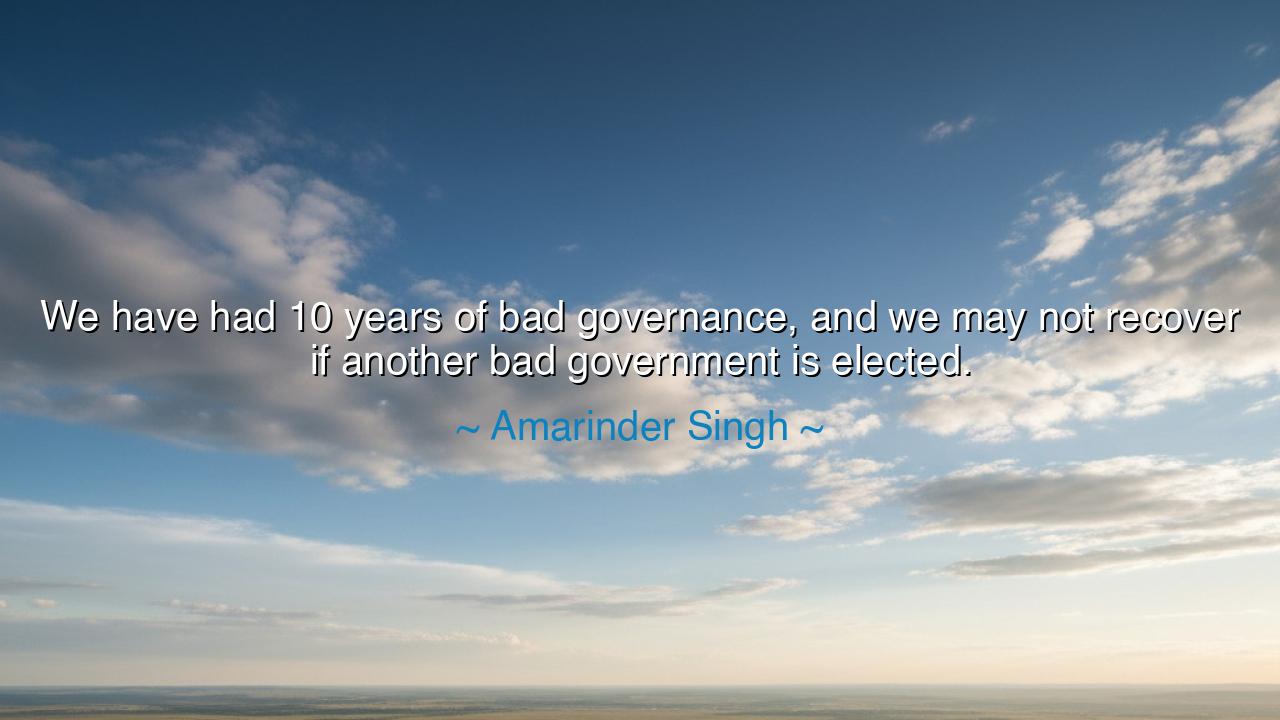
We have had 10 years of bad governance, and we may not recover if
We have had 10 years of bad governance, and we may not recover if another bad government is elected.






In the turbulent river of politics, where nations rise and fall upon the strength of their leaders, Amarinder Singh, a soldier turned statesman, once spoke words of both warning and wisdom: “We have had ten years of bad governance, and we may not recover if another bad government is elected.” His words echo not only in the chambers of his homeland but across all time and all lands, for they speak to a truth eternal — that governance is the heartbeat of civilization, and when that heart weakens, the whole body of the nation trembles. Bad governance is not merely incompetence; it is a slow poison that seeps into every vein of public life, corrupting trust, destroying institutions, and leaving behind a generation of disillusionment.
Amarinder Singh spoke these words in the context of modern India, but their meaning is older than empires. For every age has known the peril of poor rule — rulers who put ambition before duty, comfort before country, and deceit before truth. Ten years of bad governance, he said, can cripple a nation not just in wealth, but in spirit. When power is misused and justice becomes a stranger, the people’s hope withers, and the soil that once bore prosperity turns barren. The damage of such misrule cannot always be seen at once; it festers quietly, weakening the moral and civic pillars upon which freedom stands.
History is filled with such warnings written in the blood of nations. Consider Rome, that eternal city, whose republic once glowed with virtue and law. For centuries it stood as a beacon of governance and order — until corruption, greed, and vanity began to corrode its foundations. Senators sought wealth more than wisdom; rulers sought glory more than good. The people, weary and deceived, surrendered liberty for spectacle. Thus fell the republic — not to an enemy’s sword, but to its own decay. Ten years of bad governance, ten more, and then a century — until Rome, once mistress of the world, became a relic of her own greatness.
This is what Amarinder Singh warns of — the slow decline that begins not with conquest, but with carelessness. When leadership fails to serve, when the government ceases to govern for the people, when lies replace truth and flattery replaces accountability, a nation may continue to move — but it moves toward ruin. He reminds us that another term of corruption, another era of indifference, could bring not mere hardship but collapse. Recovery from such wounds is not quick. The rebuilding of faith in institutions, in justice, in the promise of democracy, takes generations. For once the people’s belief in their leaders dies, the soul of the nation begins to perish with it.
Yet these words, though heavy, are not born of despair. They are a call to vigilance — a call to the citizen, who in every age is the true guardian of the republic. The fate of nations lies not in the stars nor in the palaces of power, but in the hands of the governed. To elect wisely is to act with foresight; to tolerate bad governance is to sow the seeds of one’s own downfall. A people who sleep through corruption will awaken one day to find their freedom gone. Amarinder’s voice, like that of a general before battle, urges his countrymen to awaken, to see clearly, to remember that democracy demands courage, not complacency.
Let us remember the story of Athens, the cradle of democracy, whose citizens once understood this sacred duty. In the age of Pericles, Athens shone because her people participated, questioned, and held their leaders to account. But in later days, when demagogues arose — men who promised everything and delivered nothing — the Athenians grew lazy in their vigilance. They chose ease over effort, comfort over conscience, and their democracy crumbled into tyranny. The lesson is ageless: freedom dies not in the hands of tyrants, but in the hearts of those who stop caring.
The lesson, therefore, is both simple and solemn: never again allow the mistakes of the past to be repeated. Every election, every decision, every act of citizenship is a stone laid in the foundation of the future. Do not be swayed by the music of false promises; look instead for leaders of integrity, of vision, of service. Demand transparency. Hold those in power accountable. For ten years of negligence can undo a century of progress, and another decade of corruption can bury hope beyond resurrection.
And so, my child of the republic, take heed of Amarinder Singh’s words as one might heed the toll of a warning bell. Bad governance is not fate — it is the consequence of apathy. But good governance is not a miracle — it is the fruit of courage. Guard it as you would guard freedom itself. For the health of a nation depends not only on its rulers but on the vigilance of its people. If you wish for recovery, for prosperity, for justice that endures, then awaken, speak, and act — for the destiny of your land is written not by governments alone, but by the will of those who choose them.






AAdministratorAdministrator
Welcome, honored guests. Please leave a comment, we will respond soon